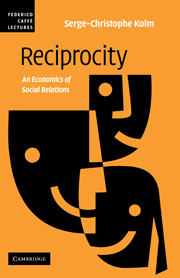Introduction
Published online by Cambridge University Press: 22 September 2009
Summary
Reciprocity is treating other people as other people treat you, voluntarily and not as a result of a binding exchange agreement. It concerns acts, attitudes or sentiments, and the tradition of social science restricts the term to favourable items (to which revenge and retaliation are only very partially symmetrical, as we shall see). When reciprocity is not the whole of a social relation – as with returning a favour, or liking people who like you –, it is generally a part of it, often necessary for the rest. For instance, a free, peaceful and efficient society requires the mutual respect of persons and properties – the police and self-defence could not suffice and are costly – and people would or could not so respect others if they were not themselves respected. This permits, in particular, the working of markets and organizations, which also requires a minimum of trust, honesty, promise keeping, or fairness – and mutual help in organizations –, which can only be reciprocal. These latter reciprocities palliate difficulties in information and coercion (in particular, they provide the main correctors of market failures). Communities of all kinds imply reciprocities of mutual help among their members and, often, between each member and the community as such. In particular, a family is primarily an intense reciprocity of services and affection. The political and public sector includes various relations of reciprocity, and the regimes known as “welfare states” add a few important ones concerning aid, health, pensions, and education.
- Type
- Chapter
- Information
- ReciprocityAn Economics of Social Relations, pp. 1 - 8Publisher: Cambridge University PressPrint publication year: 2008

